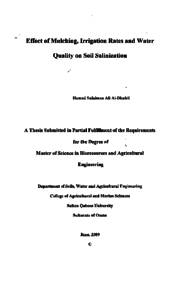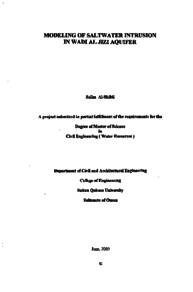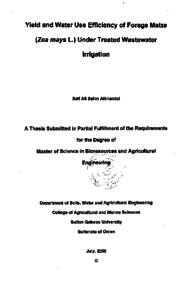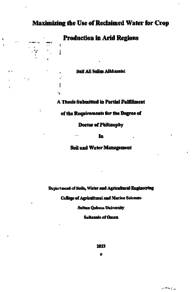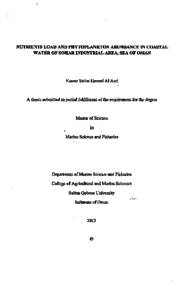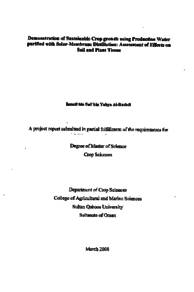Document
Effect of seawater irrigation on germination seed of Ceratonia siliqua L. and their treatment with seaweed extracts.
Identifier
https://journals.squ.edu.om/index.php/squmj
Source
Sultan Qaboos University Journal for Science, v. 29, no. 3, p. 34-39.
Contributors
Abdulrraziq, Ahmed Amrajaa., Author
Alwan, Abdoun Hashim., Author
Other titles
تأثير الري بمياه البحر على إنبات بذور Ceratonia siliqua L. ومعالجتها بمستخلصات الأعشاب البحرية.
Country
Oman
City
Muscat
Publisher
College of Science, Sultan Qaboos University.
Gregorian
2024
Language
English
Subject
English abstract
The Libyan coasts provide a diverse environment with many seaweeds that are underutilized in agricultural development. The present study aimed to evaluate the effect of irrigation with seawater at concentrations (0, 10, 20, 30, and 40%) on the germination of wild and cultivated Ceratonia siliqua L. seeds and treatment by pre-soaking for 24 hours at a concentration of 10% of three species of seaweed extracts (Padina pavonica, Sargassum vulgare, Posidonia oceanica). The results showed that C. siliqua seeds were able to germinate under seawater irrigation levels up to 30% with a germination percentage of 18%. Salinity stress significantly decreased germination percentage, delayed mean germination time, and reduced radical lengths. The seeds treated with seaweed extracts showed improved performance and were able to tolerate salinity up to 40%. P. pavonica was observed as the most efficient in mitigating the adverse effects of salinity. The results showed no significant differences between wild and cultivated C. siliqua seeds for all studied traits. The study concluded that seaweeds could be used as a promising bio-stimulant in agricultural development fields.
ISSN
2075-0528
Resource URL
Arabic abstract
تعد السواحل الليبية بيئة متنوعة تضم العديد من الأعشاب البحرية التي لم يتم استغلالها بشكل كاف في مجالات التنمية الزراعية. أجريت الدراسة الحالية بهدف تقييم تأثير الري بمياه البحر بتركيزات (0، 10، 20، 30، 40%) على إنبات بذور الخروب (Ceratonia siliqua L.) البرية والمستزرعة، ومعالجتها بالنقع المسبق لمدة 24 ساعة بتركيز 10% لثلاثة أنواع من مستخلصات الأعشاب البحرية (Padina pavonica, Sargassum vulgare, Posidonia oceanica). بينت النتائج أن بذور الخروب كانت قادرة على الإنبات تحت مستويات الري بمياه البحر حتى تركيز 30% بنسبة إنبات بلغت 18%. أدى الإجهاد الملحي إلى انخفاض معنوي في نسبة الإنبات، وتأخير متوسط زمن الإنبات، واختزال أطوال الجذير. أظهرت البذور المعالجة بمستخلصات الطحالب البحرية تحسنًا في الأداء، حيث أصبحت قادرة على تحمل الملوحة حتى تركيز 40%. وُجد أن مستخلصات P. pavonica كانت الأكثر كفاءة في الحد من التأثير السلبي للملوحة. وأظهرت النتائج عدم وجود فروق معنوية بين بذور الخروب البرية والمستزرعة في جميع الصفات المدروسة. خلصت الدراسة إلى إمكانية استخدام الأعشاب البحرية كمحفز حيوي واعد في مجالات التنمية الزراعية.
Category
Journal articles

